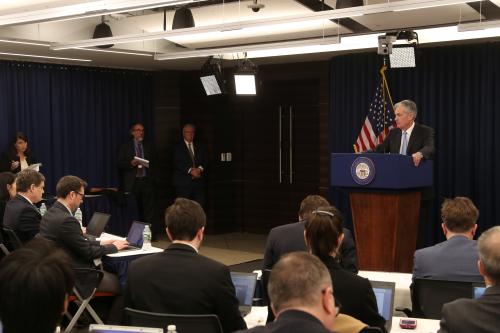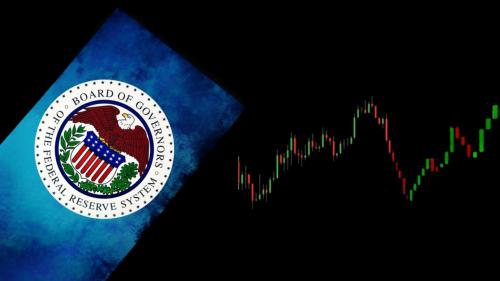In her first public appearance since leaving the Federal Reserve, Janet Yellen was interviewed by her predecessor, Ben Bernanke, on Feb. 27, 2018 at an event hosted by the Hutchins Center on Fiscal and Monetary Policy at Brookings. Here are 10 high points of the conversation. A video and transcript of the entire conversation is available here.
The Past
1. On her mentor, Nobel laureate James Tobin of Yale University
“Tobin was my teacher, but I will have to say he was more than my teacher. He was actually an inspiration to me. I think what impressed me was not only his analytic skills and his knowledge of macroeconomics and the work that he did, but also his very strong commitment to social justice and to the view that economics is magical and it’s about making the world a better place.”
2. Past research on whether monetary policy can combat unemployment
“[Efficiency wage] theories essentially explained why it is that wages may be set at levels above those consistent with market clearing. But this isn’t necessarily an explanation of business cycles. An important question… is there anything monetary policy can do to combat unemployment? The theory…doesn’t automatically have any rule for monetary policy because this kind of wage setting is referred to as real wage rigidity. To explain why monetary policy might work, it was necessary to explain why money wages or nominal wages and prices might be sticky. We worked on a theory that we referred to as near rationality. Essentially what we tried to show was that in a world where efficiency wage type considerations were prevalent, firms could follow rules of thumb in adjusting wages and prices that would lead to slow adjustment. And while these rules might not be exactly optimal or profit-maximizing from their point of view, the cost to them of following these rules would be second-order small or miniscule, but their consequences for the aggregate level of wages, prices, and adjustments would be substantial. Therefore, monetary policy could work.”
And I thought, nobody is going to be awake by the time he gets to this…That was an error in judgment on my part. He gave the speech and the stock market immediately swooned.
3. Her preview of Greenspan’s 1996 “irrational exuberance” speech
“Alan was also very focused on the stock market at the time. He gave his famous irrational exuberance speech….in advance, and he asked my opinion. I read this long, dry speech. I think it was something like page 26 of the speech he was going to give in the evening…and there was this reference to “irrational exuberance.” And I thought, nobody is going to be awake by the time he gets to this…this is really just deeply buried. And I told him I thought this was simply too mild and nobody would get the point. That was an error in judgment on my part. He gave the speech and the stock market immediately swooned.”
4. Pre-crisis concerns about commercial real estate lending
“Of course, in San Francisco, you couldn’t go to a cocktail party without people telling eye-popping tales about deals that had been struck on houses and which house prices were going up…I had directors who were simply telling me about broad-based financial excess. The way one person put it was…the banks and financial institutions are just absolutely throwing money at us, never seen anything like it. I heard about this and I thought, you know, this is just really broad-based financial excess. So I was quite concerned about it…I think what I failed to appreciate was, what if housing prices began to fall? I just really did not understand how vulnerable the financial system and particularly the shadow banking system was, how leveraged it was, how much maturity transformation there was, how much of this risk that we thought was being disbursed through the economy was really remaining on the books of these institutions. So I wrongly thought if housing prices fell a medium amount it would do damage to the economy and the outlook, but it would not destroy the core of the financial system. And I think that was a failure to appreciate the weaknesses.”
The Fed’s 2 percent inflation target
5. Establishing an inflation target
“I was on record then [1996] as saying that I thought we should adopt a numerical inflation target, and that I thought it should be 2 percent. I think I articulated the reasons about the zero lower bound and nominal wage rigidity that later became central to our decisions. Alan [Greenspan’s]view was that we should not adopt an inflation target at all. And, of course, he was successful in stopping that from happening until you [Ben Bernanke] and I worked together. I think it had long been your desire to see this happen as it had been mine, and I think you especially should feel proud that you were able to put in place what I think has been a successful framework.”
6. Revisiting the inflation target
“I suppose that with the type of reasoning that led us to the 2 percent inflation target—which was partly based on estimates of how often you’d hit the zero lower bound—we probably would come out with a higher inflation target now if we were starting from scratch. But moving to a higher inflation target is a tricky business. I’m not sure that Congress would regard it as consistent with their mandate of price stability. I think the transition from a lower to a higher inflation target would be a difficult one and could succeed in unanchoring inflation expectations that I interpret as reasonably well anchored around 2 percent. And that’s been a tremendous advantage to monetary policy…So it’s certainly worth considering the costs and benefits, but it’s not a clear, ‘yes, we should have a higher target.’ That takes you to other systems, like nominal GDP targeting that has some interesting advantages, or price level targeting…I think they’re worth studying, debating, because this is an important issue. Is there a silver bullet there? Something that just obviously is going to work and make a huge difference? I will admit to a little bit of skepticism about that. I think these systems would have to be very well understood by the public, and I think explaining how any of these systems would work to the public is a difficult task.”
7. On forecasting inflation today
“I see the standard framework that sees inflation as being largely determined by inflation expectations, slack in the labor market, and slack in a variety of supply shocks, as a reasonably sound framework for thinking about inflation. And I don’t think that it’s exhibited massive failures in recent years. Yes, inflation has been now for many years below 2 percent. Such a framework would have attributed that to, first, a lot of slack in the labor market, plus plummeting oil prices and an appreciation of the dollar. So for many years, low inflation has not been mysterious in terms of its causes. In 2017, the model saw no reason for inflation to be as low as it was, so that was a negative error term. In 2016, exactly the opposite was true: inflation hit 2 percent, the model didn’t expect it to be at 2 percent. Of course, there are errors. I’m not saying that we have a perfect understanding of inflation. There are a whole variety of shocks that cause actual inflation in any year to depart from the predictions of the model. But it’s not as though the errors have all been one-sided in a way that would cause you to say this model just isn’t working, we really need to rethink it.”
The Present
8. Fiscal policy should play a bigger role
“[L]et me just say…it’s not a healthy situation for monetary policy to be the only game in town. I would like to see a situation in which fiscal policy was in a better position to make a contribution on the kinds of occasions and situations we’re talking about…that’s one reason that our current fiscal situation concerns me as much as it does.”
[L]et me just say…it’s not a healthy situation for monetary policy to be the only game in town.
9. The financial system is better positioned to absorb a shock
“[A]t the moment, I think there’s general agreement that asset prices are elevated…An important question now… would be if asset prices were to fall, what would that mean about the economy and the financial system? I would agree with the general conclusion that’s incorporated in last week’s Monetary Policy Report, which is that we have a much stronger financial system. It’s well capitalized, has a lot of liquidity, has relatively little exposure to declining equity prices…[W]e do regular stress testing and look, for example, in that stress test for what the consequence would be of sharp declines in commercial real estate prices. I would generally conclude that, as that report does, that overall risks to financial stability are moderate. They’re not elevated at this point. Leverage is very much lower. The financial system is stronger. In some nonfinancial corporations, we’ve seen a notable increase in leverage, especially among riskier corporations, lower rated corporations. But household debt has gone down relative to income since the crisis substantially. So in that sense, if there were to be an adjustment in asset prices, I think this economy is better able to absorb it than it would be were the financial system less sound.”
10. Leading the Fed is like a designer choosing a paint color
“[W]hat I do is I often compare the job of managing the committee to the issue a designer would have to face who is trying to decide what’s the right color to paint a room. You have 19 people around the table, and you want to come up with a decision we can all live with on what color to paint the room. And we’d go around the table. Ben, what would you like? You think baby blue is just absolutely ideal. David, what do you think? Chartreuse you think is a lovely color. And we go around the room like that. And the question is, are we ever going to converge? I would feel my job is get everybody to see that off-white is not a bad alternative. As brilliant as your choice was, maybe you could live with off-white, and it’s not so bad. And we can converge on that and it’s going to function just fine and maybe we can agree.





Commentary
Janet Yellen: 10 quotes on her past and the economy
March 5, 2018